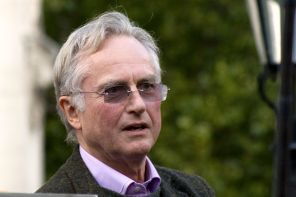Coming to the defense of Richard Dawkins is an odd personal pastime for someone that did not grow up in a stifling religious community or for someone without much talent or understanding of the biological sciences, of which I am both. But time and again, I found myself defending Dawkins as a brilliant scientist first and foremost, often assuming correctly that those that disparaged him were unfamiliar with his scientific accomplishments. I have always found that his remarks on religion, though caustic and sometimes mean-spirited, have served as tools of liberation and justification for untold numbers of of people whose faith communities hurt them far worse than any of Dawkins’ rhetoric might hurt a believer.
However, the last few years of petty, sometimes vitriolic social media engagement and a strange public row with a young atheist woman rendered my usually fiery defenses a bit half-hearted. And while those instances are still troubling, the early-fall release of An Appetite for Wonder: The Making of a Scientist and an interview in late December reintroduced many fans to the Dawkins that we came to admire in the first place: a brilliant but humble scientific mind whose passion for the discovery and understanding of the natural world eclipses his passion for the denigration of those who believe in a world that cannot be accounted for.
The interview was naturally not without Dawkins’ typical dismissal of his opponents and their beliefs. When he spoke of how off-limits the critique of religion has become, he noted, “People really, really hate their religion being criticized. It’s as though you’ve said they had an ugly face, they seem to identify personally with it.” (emphasis mine). For the authentically devout, there is no “seem” about it. They do personally identify with it. Religious belief and practice are the material and verbal manifestations of a person’s understanding of their very essence, of who they are, of what they are, and of what breathed life and purpose into them. Of course it’s going to be taken personally.
Dawkins also responds to the claim that he is thought to be something of a bad guy by saying, “I don’t know how many people think I’m mean. I’m certainly not…” It makes one prone to wonder whether or not Dawkins has a ghost-writer for his Twitter account or only the vaguest memories of his own speeches.
With those two exceptions, however, the overwhelming focus of the interview was not on the public persona of Richard Dawkins: Atheist Firebrand, but on Richard Dawkins: Lover of the Poetry of Science. Dawkins of course never stopped being a scientist or professor, but most of his mainstream coverage and outings have been as the former over the last several years. In the interview, he talks controversies within the scientific fields, molecular genetics as a branch of information technology, and Darwin, Darwin, Darwin. He considers the love of science as an extension of loving truth and clarity, or perhaps vice versa. He never shies away from or downplays his attacks on religion (on the contrary, he seem them as part of revealing truth through science), but the topic is only central when prompted.
What is most heartening about the interview is his recollection of the US book tour for An Appetite for Wonder, when he recalls “…I noticed even more forcibly than before the enormous numbers of people who come into the book-signing queue, and they nearly always say something like, ‘I became a scientist because of you, you’ve changed my life.’” To know that more people are lining up to thank Richard Dawkins for his contributions to science is something to be glad about for those of us who feel that what we actually do with our lives is more important than what we believe in them. As someone who does not believe there is a god to answer to eventually, all we have are our actions here on Earth. And to become a scientist is to make an important and bold contribution to the understanding of, and hopefully the improvement of, life on this planet.
I read The God Delusion a month prior to enrolling at Yale Divinity School and it brought me to tears. Not because it was the straw that broke the camel’s back in terms of relieving me of my religious beliefs once and for all (If I’m honest, it was broken long before I submitted by application). I wept because Dawkins is a particularly moving poet when he talks about evolutionary biology and especially when he writes about Charles Darwin.
I recall the distinct sense of wonder and awe that Dawkins, a man whose discoveries might excuse him from ever having to express anything but smug superiority, expressed when he wrote about unraveling the mysteries of the natural world. It was an awe not dissimilar to my own reactions to the poetry of the Psalms or of the heartbreaking, radical love I witnessed in the story of the Incarnation. The difference was that I was experiencing beauty and mistaking it for my truth whereas Dawkins had found both in his chosen field.
Rather than having fights online with the rather low-hanging fruit among his detractors, my hope is that the release of An Appetite for Wonder a few months ago, and the subsequent inspiration and awe around scientific discovery that readers have experienced, will bring out more of the Dawkins that so many came to respect and admire before he was made most famous for his atheism. Not because of what he believes or disbelieves, but for his myriad contributions to unlocking mysteries of the known world and for writing so beautifully about the poetry of science that he brings out the kind of awe and wonder that prompts others to do the same.




